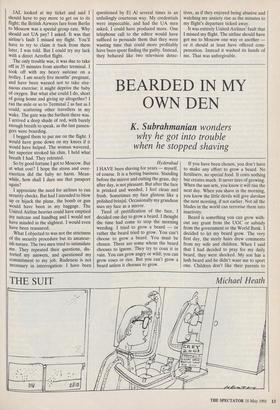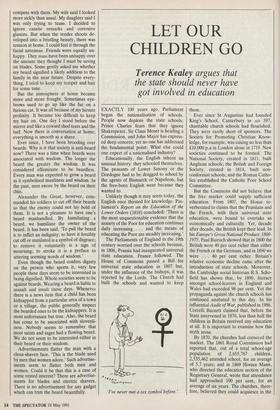BEARDED IN MY OWN DEN
K. Subrahmanian wonders
why he got into trouble when he stopped shaving
Hyderabad I HAVE been shaving for years — myself, of course. It is a boring business. Standing before the mirror and cutting the grass, day after day, is not pleasant. But after the face is prinked and weeded, I feel clean and fresh. Sometimes my face glistens like a polished brinj al. Occasionally my grandson uses my face as a mirror. Tired of prettification of the face, I decided one day to grow a beard. I thought the time had come to stop the morning weeding. I tried to grow a beard — or rather the beard tried to grow. You can't choose to grow a beard. You must be chosen. There are some whom the beard chooses to ignore. They try to coax it in vain. You can grow angry or wild; you can grow roses or rice. But you can't grow a beard unless it chooses to grow.
If you have been chosen, you don't have to make any effort to grow a beard. No fertilisers, no special food. It costs nothing but creates much. It never tires of growing. When the sun sets, you know it will rise the next day. When you shave in the morning, you know the little devils will give darshan the next morning, if not earlier. Not all the blades in the world can terrorise them into inactivity.
Beard is something you can grow with- out any grant from the UGC or subsidy from the government or the World Bank. I decided to let my beard grow. The very first day, the steely hairs drew comments from my wife and children. When I said that I had decided to pray for my daily beard, they were shocked. My son has a lush beard and he didn't want me to sport one. Children don't like their parents to
compete with them. My wife said I looked more sickly than usual. My daughter said I was only trying to tease. I decided to ignore caustic remarks and corrosive glances. But when the tender shoots de- veloped into a bristling beauty, there was tension at home. I could feel it through the facial antennae. Friends were equally un- happy. They must have been unhappy over the amount they thought I must be saving on blades. Some gently asked me whether my beard signified a likely addition to the family in the near future. Despite every- thing, I tried to keep my temper and hair for some time.
But the atmosphere at home became more and more fraught. Sometimes eye- brows used to go up like the fur on a furious cat. It was all because of my hirsute prolixity. It became too difficult to keep my hair on. One day I stood before the mirror and like a coward shed tears and the turf. Now there is conversation at home; everything is smooth as a shave.
Ever since, I have been brooding over beards. Why is it that society is anti-beard now? There was a time when beards were associated with wisdom. The longer the beard the greater the wisdom. It was considered effeminate to be beardless. Every man was expected to grow a beard as it symbolised manliness and wisdom. In the past, men swore by the beard on their chin.
Alexander the Great, however, com- manded his soldiers to cut off their beards so that the enemy could not lay hold of them. It is not a pleasure to have one's beard manhandled. By humiliating a beard, we humiliate the owner of the beard. It has been said, 'To pull the beard is to inflict an indignity; to have it forcibly cut off or mutilated is a symbol of disgrace; to remove it voluntarily is a sign of mourning; to stroke it is a preface to uttering seeming words of wisdom.'
Even though the beard confers dignity on the person who sports it, very few people these days seem to be interested in being dignified. Whole societies seem to be against beards. Wearing a beard is liable to assault and insult these days. Whenever there is a news item that a child has been kidnapped from a particular area of a town or a village, the public generally suspect the bearded ones to be the kidnappers. It is most unfortunate but true. Also, the beard has come to be associated with slovenli- ness. Nobody seems to remember that most saints and sages had a flowing beard. We do not seem to be interested either in their beard or their wisdom.
Advertisements flatter the man with a clean-shaven face. 'This is the blade used by men that women adore.' Such advertise- ments seem to flatter both men and women. Could it be that this is a case of some vested interest? There are advertise- ments for blades and electric shavers. There is no advertisement for any gadget which can trim the beard beautifully.



























































 Previous page
Previous page